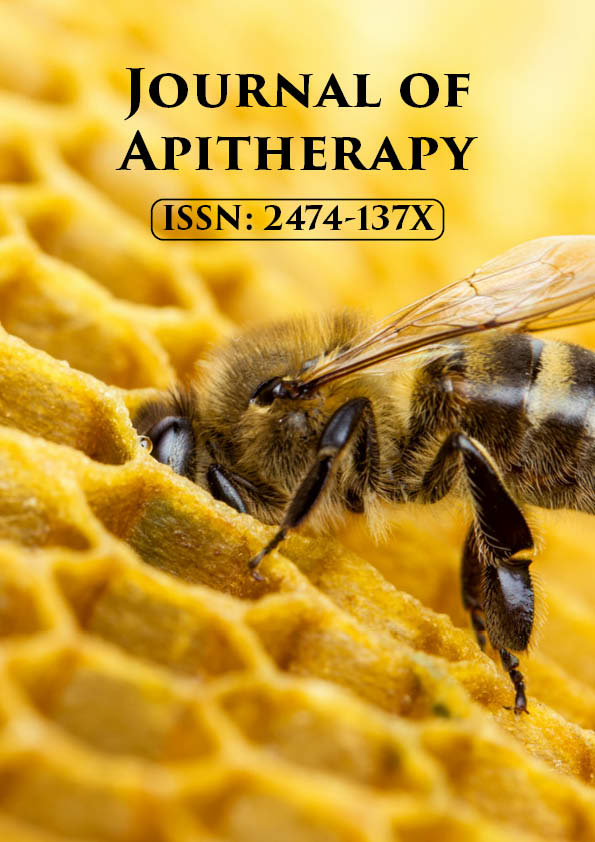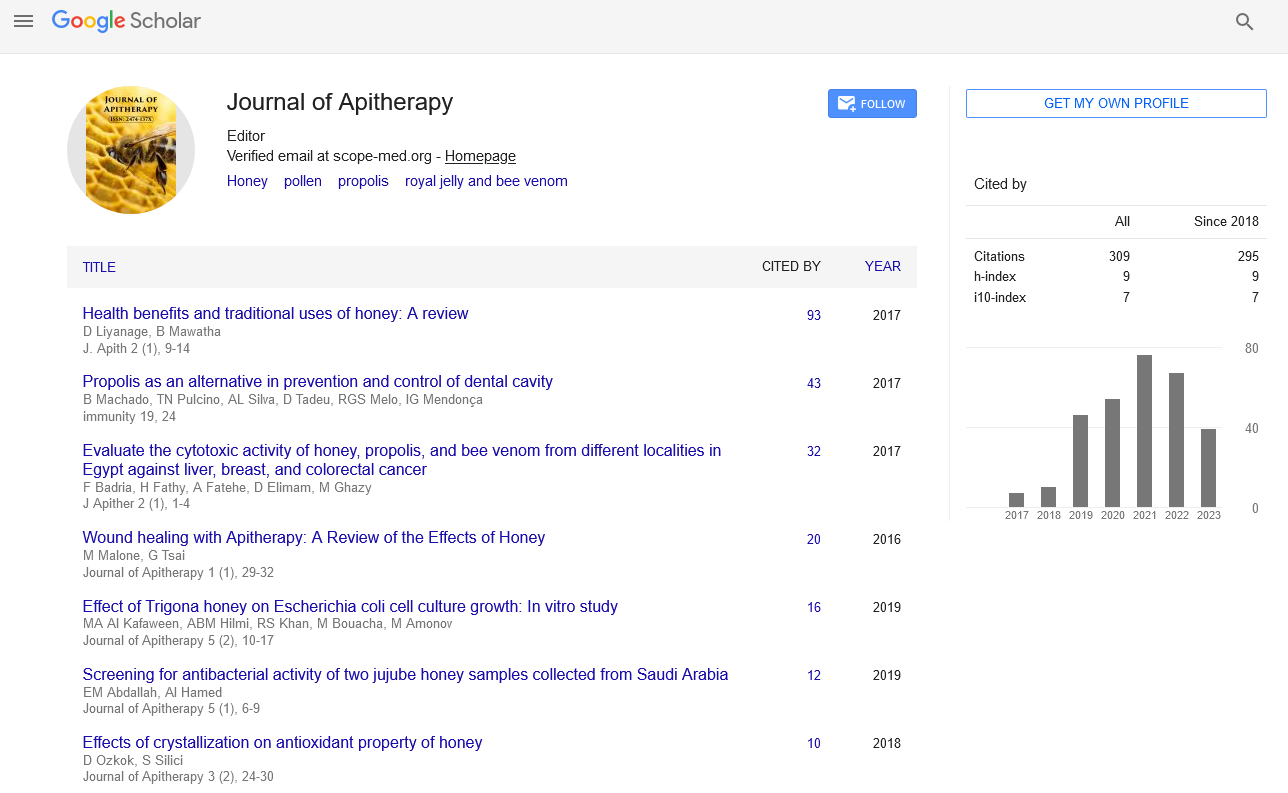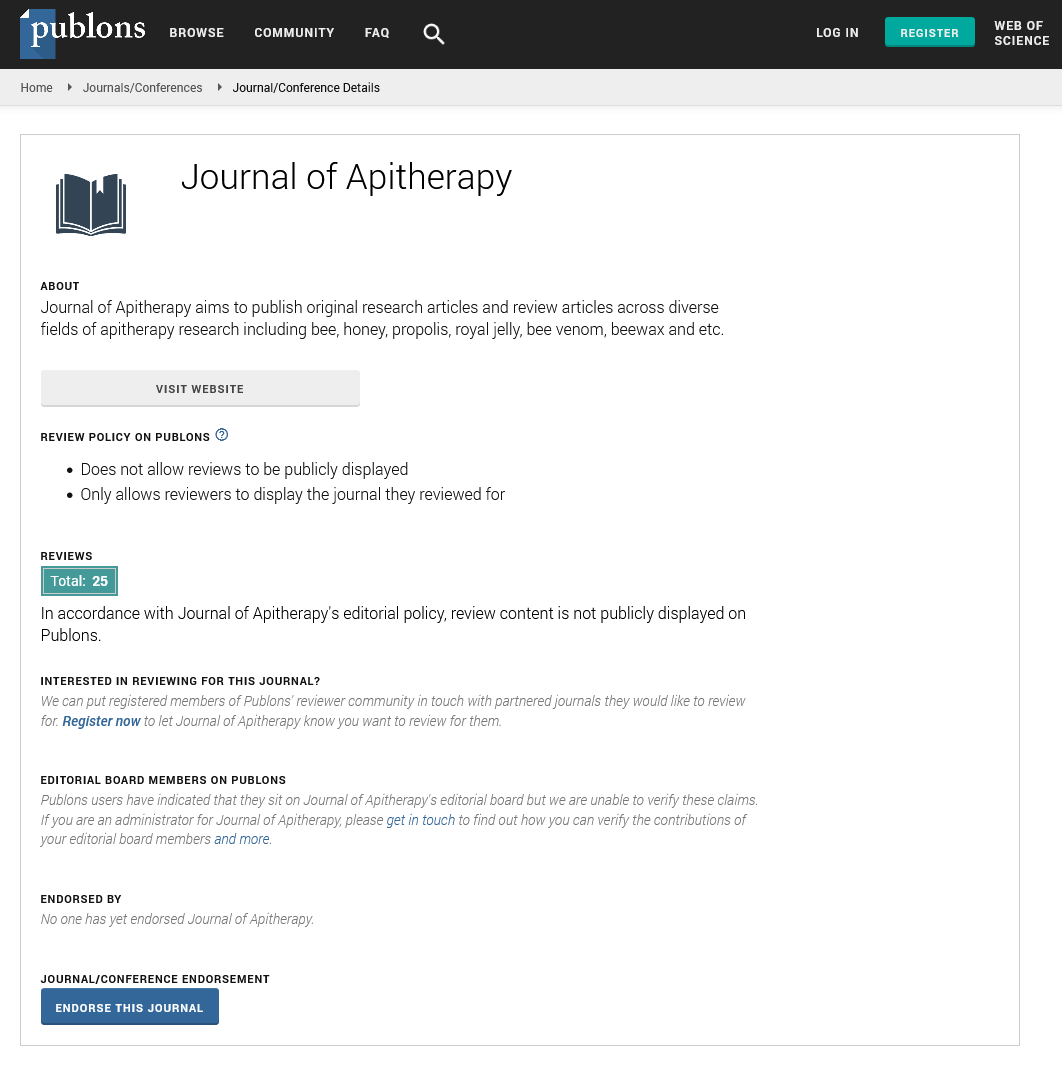Commentary - Journal of Apitherapy (2024)
Therapeutic Properties and Applications of Apiceuticals in Medicine
Ava Jones*Ava Jones, Department of Apiculture, Gurudas University, Kolkata, India, Email: ava@gmail.com
Received: 27-Apr-2024, Manuscript No. JAPITHERAPY-24-138910; Editor assigned: 29-Apr-2024, Pre QC No. JAPITHERAPY-24-138910 (PQ); Reviewed: 14-May-2024, QC No. JAPITHERAPY-24-138910; Revised: 21-May-2024, Manuscript No. JAPITHERAPY-24-138910 (R); Published: 28-May-2024
Description
Apiceuticals refer to therapeutic products derived from substances produced by honeybees, such as honey, propolis, royal jelly, bee venom, and bee pollen. These natural substances have been used for centuries in traditional medicine and are gaining increasing attention in modern scientific research for their diverse health benefits and potential applications in medical treatments, skincare, and nutrition. This article analyze the different types of apiceuticals, their bioactive compounds, therapeutic properties, and current and future roles in healthcare and wellness.
Types of apiceuticals
Honey: Honey is a natural sweetener produced by honeybees from the nectar of flowers. It contains various enzymes, vitamins, minerals, and antioxidants. Different types of honey, such as Manuka honey, are known for their antibacterial and wound-healing properties.
Propolis: Propolis, also known as bee glue, is a resinous substance collected by honeybees from tree buds and used to seal and protect the hive. It contains flavonoids, phenolic acids, and other bioactive compounds with antimicrobial, anti-inflammatory, and antioxidant effects.
Royal jelly: Royal jelly is a secretion produced by worker bees to feed larvae and queen bees. It is rich in proteins, vitamins (particularly B vitamins), minerals, and fatty acids. Royal jelly is believed to have anti-aging, immune-modulating, and nutritional properties.
Bee venom: Bee venom is a complex mixture of proteins and peptides injected by honeybees as a defense mechanism. It contains compounds such as melittin and apamin, which have been studied for their anti-inflammatory, pain-relieving, and anticancer properties.
Bee pollen: Bee pollen is collected by honeybees from flowering plants and is packed with proteins, amino acids, vitamins, minerals, lipids, and antioxidants. It is marketed as a dietary supplement for its potential benefits in enhancing energy levels, immune function, and overall well-being.
Research and scientific advancements
Scientific research on apiceuticals continues to expand, analysing their mechanisms of action, safety, and efficacy:
Biomedical research: Studies are investigating the specific bioactive compounds in apiceuticals and their effects on cellular pathways. This research aims to identify new therapeutic targets and develop novel treatments.
Clinical trials: Clinical trials are evaluating the efficacy of apiceuticals in treating various health conditions, including wound healing, dermatological disorders, immune modulation, and chronic inflammatory diseases.
Formulation development: Researchers are developing new formulations and delivery methods to optimize the bioavailability and therapeutic potential of apiceuticals.
Safety and regulation: Regulatory agencies are establishing guidelines for the safe use of apiceuticals in healthcare and consumer products. Ensuring quality control and standardized production methods are crucial for their efficacy and safety.
Challenges and considerations
Despite their potential benefits, apiceuticals present challenges and considerations:
Allergies: Some individuals may be allergic to bee products like honey, propolis, or bee venom. Careful assessment and monitoring are necessary, especially in clinical settings.
Sustainability: Sustainable beekeeping practices are essential to ensure the availability and quality of apiceuticals. Environmental factors, including pesticide use and habitat loss, can impact bee health and product quality.
Ethical considerations: Ethical considerations include bee welfare and fair trade practices. Supporting responsible beekeeping and biodiversity conservation is important for sustainable apiceutical production.
Apiceuticals represent a diverse array of natural products derived from honeybees, each with unique bioactive compounds and therapeutic properties. From wound healing and skincare to immune support and nutritional supplementation, apiceuticals offer a natural approach to health and wellness. Ongoing research and clinical studies continue to uncover their potential benefits and applications, paving the way for their integration into modern medicine and everyday healthcare practices. As scientific knowledge advances and regulatory frameworks evolve, apiceuticals are poised to play an increasingly significant role in promoting human health and enhancing quality of lifes.







